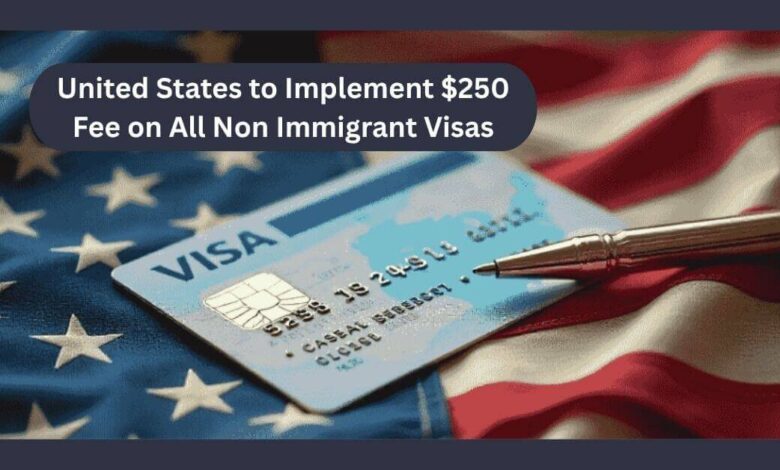United States to Implement $250 Fee on All Non Immigrant Visas from 2025

The United States has announced that, starting in 2025, a $250 fee will be applied to all non-immigrant visa applications. This new policy is part of broader changes aimed at updating visa processing and administrative costs. The fee will affect individuals applying for various short-term U.S. visas, including those for tourism, study, and work.
Who Will Be Affected?
This fee is a significant burden for anyone, regardless of whether they are a student who aspires to attend Harvard, a tourist who is interested in Times Square, or a professional who is en route to Silicon Valley. It is intended for non-immigrant visa applicants, including those who are applying for F-1 student visas, H-1B work permits, J-1 exchange visas, B-1/B-2 tourist/business visas, and other visas.
Even petitioners from affluent nations who are not eligible for the Visa Waiver Program (or who apply for longer-term visas) will not be exempt. Travelers from countries such as India, Nigeria, Brazil, Pakistan, Egypt, South Africa, and the Philippines, which are already experiencing high processing costs and long wait periods, are expected to be the most affected.
Here’s the Twist: It Might Be Refundable—But Only If You Obey the Rules:
In a surprising development, the United States government has announced that this fee may be refunded—provided that you depart the United States punctually, adhere to all visa requirements, and refrain from working illegally or overstaying. However, the actual operation of this refund system is still enveloped in uncertainty. There are no guarantees, no defined mechanism, and no timeline.
Why Is This Happening?
The purpose of this action, according to the U.S. government, is to enhance immigration enforcement, reduce visa exploitation, and ensure that travelers are held accountable. But critics contend that it imposes an unjust burden on global mobility, particularly on honest travelers who already adhere to the rules. Numerous individuals are concerned that the impending 2026 FIFA World Cup will discourage millions of individuals from traveling to the United States.
Check Also: Easiest Countries to Obtain Work Visa – Full Guide
What You Need to Know Before You Apply?
- The fee is applicable to virtually all visa categories, with the exception of diplomatic and specific short-term visits under the Visa Waiver Program.
- It is mandatory to pay the fee at the time of visa issuance, and it will be collected irrespective of your destination, purpose, or country of origin.
- In addition to the current visa fees, students and laborers may now be required to pay $400–$600 in order to obtain permission to enter the United States.
What This Means for You?
Prepare your pocketbook if you intend to study, intern, work, or visit family in the United States in the upcoming year or beyond. Many applicants may be compelled to reconsider their plans or postpone their applications as a result of this fee. Compliance will be more critical than ever for those who continue on, as it is contingent upon your ability to reclaim this substantial quantity.
The world is closely monitoring the United States’ recent decision to increase the stakes for international mobility.
References:
- https://travel.state.gov/content/travel/en/us-visas/visa-information-resources/fees/fees-reciprocity-tables.html
- https://www.nafsa.org/regulatory-information/budget-law-imposes-nonimmigrant-visa-integrity-fee.
Frequently Asked Questions:
What is the Visa Integrity Fee?
A new $250 non‑waivable fee required for nearly all nonimmigrant visa categories: tourism/business (B‑1/B‑2), student (F‑1/F‑2, M), exchange (J‑1/J‑2), temporary work (H‑1B, L‑1, O‑1, P, etc.)
This fee is in addition to existing application fees (e.g. $185 MRV fee for B visas, $205 for petition-based categories) and also any reciprocity or other chargesWhen does this take effect?
The bill—called the “One Big Beautiful Bill Act” (H.R. 1)—was signed on July 4, 2025
Technically applicable for U.S. fiscal year 2025 (Oct 1, 2024 – Sept 30, 2025), with implementation likely only from late 2025 or early fiscal 2026 (around October 1, 2025)
No exact implementation mechanism or date has yet been published; the Department of Homeland Security and DOS are still preparing to collect itWho must pay the fee?
All applicants issued a nonimmigrant visa stamp must pay $250, including dependents (e.g., H‑4, F‑2, J‑2, L‑2
Citizens of Visa Waiver Program (VWP) countries, most Canadians and Bermudans traveling under visa waiver or using ESTA, are exempt—unless they require a visa for their purpose of travel



